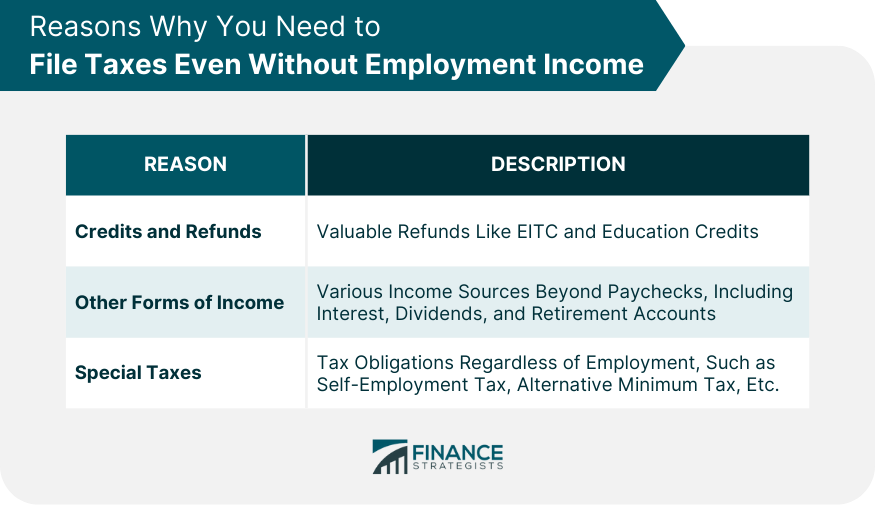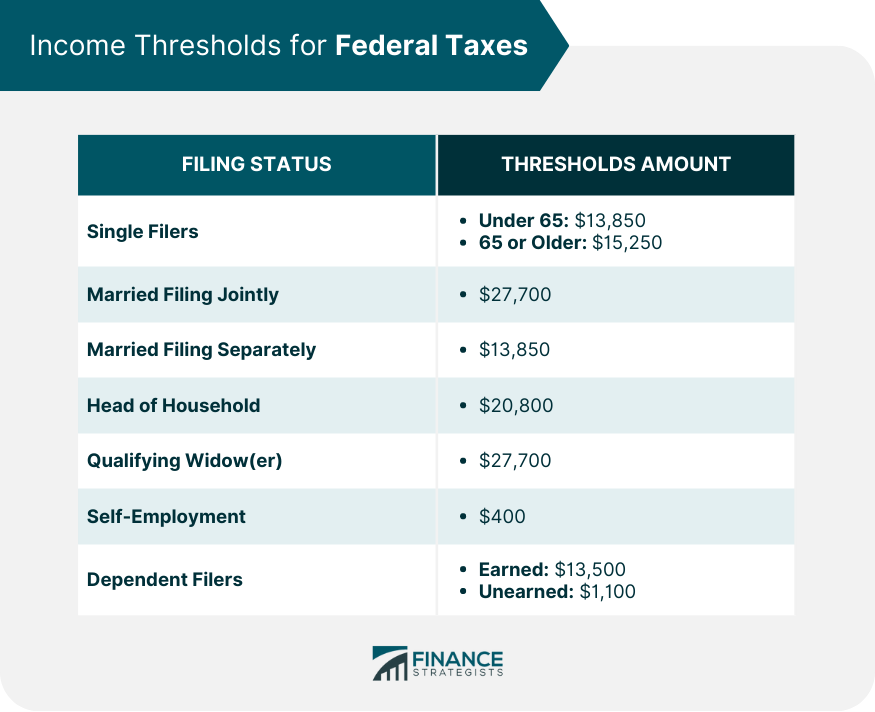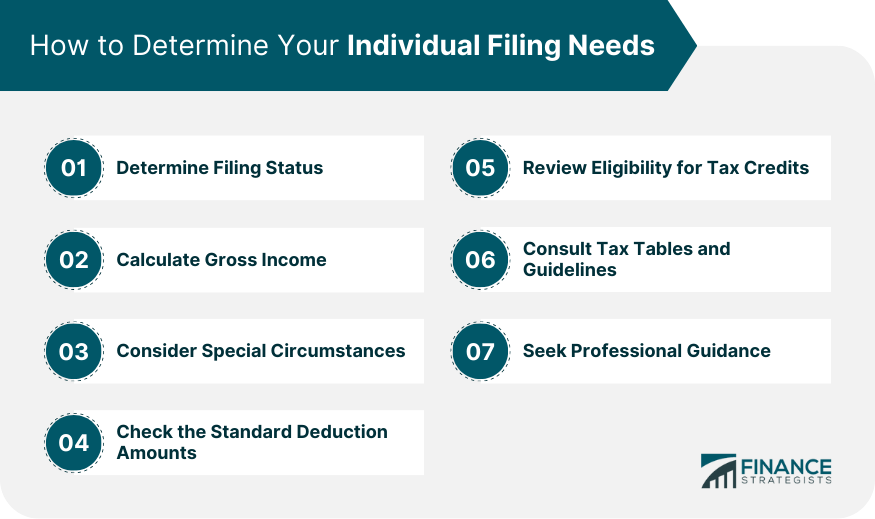Navigating the world of taxes can be confusing, especially when circumstances diverge from the norm. At a glance, if you have no income, you typically aren't required to file a federal tax return. The primary reason for most individuals to file taxes is to report employment income and pay any taxes due. However, like most financial matters, there are more implications to consider. While having zero employment income generally suggests no filing requirement, exceptions do exist. There are situations where individuals may still want or need to file a return. For example, if one wants to claim certain credits or refunds, such as the Earned Income Tax Credit (EITC)for those with minimal income, filing becomes necessary. Additionally, if someone owes special taxes, including self-employment tax from freelance work, they'll need to file even if they haven't held traditional employment. It's always wise to familiarize oneself with these scenarios or consult a tax professional to ensure compliance with tax regulations. EITC can provide a valuable refund even to those with minimal income. Moreover, students might be eligible for the American Opportunity Credit or the Lifetime Learning Credit for education expenses. Not filing might mean missing out on money the government owes you or beneficial opportunities to reduce any potential tax liability. Many individuals mistakenly believe that if they don't receive a paycheck, they don't have taxable income. However, forms of income such as interest from savings accounts, dividends from stock investments, and distributions from retirement accounts might still create a tax liability. Additionally, barter exchanges (goods or services exchanged without cash) can also be considered taxable income. If you’re involved in any such exchanges, understanding the value of the transaction becomes essential to ensure compliance with the tax code. Some taxes are due regardless of your employment situation. For instance, if you did any freelance or consulting work in the past, you might owe self-employment tax. Similarly, certain financial situations can trigger the Alternative Minimum Tax. Moreover, individuals with extensive investments might be subjected to the Net Investment Income Tax. Recognizing where you fall can aid in making informed decisions about your tax obligations, ensuring compliance, and taking advantage of potential benefits. For single individuals under 65, the threshold generally starts at the estimated standard deduction amount of $13,850. Once their gross income surpasses this amount, they are typically required to file. Single taxpayers who are 65 or older might have an additional $1,400 due to the standard deduction amount granted for age. For married couples filing jointly, the threshold is combined, meaning both spouses' incomes are considered. The estimated threshold is approximately $27,700, doubling that of single filers. For married couples filing separately, the threshold is $13,850. Choosing this filing status can sometimes be a strategic move in specific situations, such as when one spouse has significant medical expenses. The estimated income threshold is around $20,800. This designation not only aids in potentially higher deductions but also serves to recognize the financial challenges faced by such individuals. However, it comes with strict qualifying rules, making it essential to ensure one genuinely meets the criteria. The estimated income thresholds resemble those for Married Filing Jointly filers, around $27,700. This provision is particularly compassionate, allowing the surviving spouse to maintain a similar tax status for a specified period after their partner's death. For those who are self-employed, the income threshold is generally much lower. If a person has earned more than $400 from self-employment endeavors, they are usually required to file a tax return, mainly to account for self-employment tax. This lower threshold underscores the government's keenness to ensure that self-employed individuals meet their Social Security and Medicare obligations. Individuals who can be claimed as a dependent on someone else's tax return have unique criteria. Their estimated income thresholds depend on the type of income they receive (earned vs. unearned) and might be around $13,500 for earned income and $1,100 for unearned. This setup recognizes that many dependents might still earn some income, like part-time jobs, but their primary financial support comes from elsewhere. Recognizing the specific implications of your situation can help avoid potential pitfalls and penalties. Here's a step-by-step guide to help you figure out your personalized tax filing requirements: Evaluate your marital status and family situation as of December 31 of the tax year in question to determine your correct filing status. Selecting the appropriate filing status ensures you'll get the most favorable tax treatment for your situation. Sum up all sources of income you've received throughout the year. This includes wages, salaries, tips, dividends, interest, rental income, business income, and any other sources. Ensure that you differentiate between earned and unearned income, as different rules might apply. Some situations necessitate filing a tax return regardless of income, such as if you owe any special taxes like the Alternative Minimum Tax, self-employment tax, or if you received distributions from a health savings account (HSA). Being aware of these ensures you won't overlook any specific obligations or exemptions. Review the standard deduction amounts for your filing status. If your income is less than the standard deduction, you typically aren't required to file a federal tax return. However, always verify the updated amounts annually since tax reforms or inflation adjustments can influence these numbers. Even if you're not required to file due to income thresholds, you might be eligible for refundable tax credits like EITC. Filing a return in such cases might result in a refund. It's essential to stay informed about tax credits each year, as these can sometimes be the key to turning a tax payment into a refund. The IRS provides tax tables and filing requirement guidelines every year. Consult these tables to see if your income level requires you to file. By familiarizing yourself with these tables, you ensure that you're basing decisions on the most accurate, up-to-date information. When in doubt, consult with a tax services professional or use tax software. These resources can provide clarity, especially if your situation is complicated or if you're unsure about any aspect of your tax obligations. Professionals can offer insights into intricate tax scenarios and can even identify overlooked deductions or credits. In the world of taxes, not having a job might seem simple, but things get complex. Although no income usually means no taxes, there are exceptions. The Earned Income Tax Credit and educational credits can help you get your money back, so not filing could mean missing out. Interest, dividends, and different kinds of exchanges can also lead to taxes. You need to think about your situation carefully – know your status, figure out how much you've earned, and find ways to avoid paying too much tax. Be aware of changes in deductions and credits. If you work for yourself, it's different. Even if you didn't earn much, you might still need to file taxes. Understanding and taking action ensure you follow the rules, gain benefits, and steer clear of tax troubles.Do You File Taxes if You Did Not Work?
Reasons Why You Need to File Taxes Even Without Employment Income
Credits and Refunds
Other Forms of Income
Special Taxes

Income Thresholds for Federal Taxes
Single Filers
Married Filing Jointly
Married Filing Separately
Head of Household
Qualifying Widow(er) With Dependent Child
Self-Employment
Dependent Filers

How to Determine Your Individual Filing Needs
Determine Filing Status
Calculate Gross Income
Consider Special Circumstances
Check the Standard Deduction Amounts
Review Eligibility for Tax Credits
Consult Tax Tables and Guidelines
Seek Professional Guidance

Conclusion
Do You File Taxes if You Did Not Work? FAQs
No, generally, you don't need to file taxes if you have no income. However, there might be exceptions based on specific situations.
Some situations require filing even without income. For example, if you're eligible for certain tax credits like the Earned Income Tax Credit, you could get a refund by filing.
Yes, unemployment benefits are considered taxable income. You may need to file taxes if your total income, including unemployment benefits, meets the filing threshold.
Yes, any income from investments like interest, dividends, or capital gains might require you to file taxes, even if you don't have a job.
If you earned more than $400 from freelance work, you typically need to file taxes. This is mainly to account for self-employment tax, which covers Social Security and Medicare contributions.
True Tamplin is a published author, public speaker, CEO of UpDigital, and founder of Finance Strategists.
True is a Certified Educator in Personal Finance (CEPF®), author of The Handy Financial Ratios Guide, a member of the Society for Advancing Business Editing and Writing, contributes to his financial education site, Finance Strategists, and has spoken to various financial communities such as the CFA Institute, as well as university students like his Alma mater, Biola University, where he received a bachelor of science in business and data analytics.
To learn more about True, visit his personal website or view his author profiles on Amazon, Nasdaq and Forbes.











